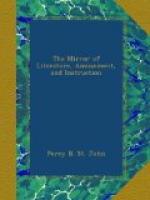The Andes take their rise literally at the “end of the World;” for Cape Horn certainly deserves that epithet, and the Straights of Magellan, which divide Terra del Fuego from the continent are comparatively no more than a mountain stream in a hilly country, so that that island may without any impropriety be deemed a part of it. The Andes are not one continuous chain of mountains; but an immensity of piles raised one on another, at different elevations of which are extensive plains, termed “Pampas,” some of which appear as boundless as the horizon, and totally divested of herbage. On one of these plains, called the Pampa of Diesmo, in the province of Junin, I was detained some days at the only hut to be seen for leagues. One of the arreoros, or muleteers, with me, a native of Madrid, remarked on the solitude of the spot, adding, with a sigh, “This was a different place when first I visited it.” Within about half a mile from where we were then conversing was an astonishing freak of Nature. In the midst of the plain were about one hundred naked rocks rising abruptly from the surface, in detached groups, some of which were as high as St. Paul’s, and many appeared like the spires of a cathedral. Pointing to these eminences, the muleteer went on to say, “for five months these rocks were my refuge from white men, and from them have I seen an army of twenty-five thousand men traverse this plain again and again; their only support for nearly fourteen months being drawn from the spot.” On asking an explanation, he bid me look round and say if I thought I could count the number of sheep on the Pampa. I readily answered I did not think there were fifty. “What will you say, sir,” said he, “when I tell you that sixteen years since, there were, on this plain alone, eight hundred thousand sheep! besides oxen; at that time there was scarcely an Indian that did not possess at least two thousand, and this was only a part of the wealth of Peru. The desolation that now exists may justly be laid to the account of a revolution, which has only been the means of creating a spirit of animosity amongst those who before were cordially united; you yourself must be aware that if it were known I was a Godo, (Old Spaniard), my life would not be worth an hour’s purchase; another thing you have yourself experienced, is the total absence of hospitality in Peru. This is also an effect of the revolution; for at the time I alluded to, a stranger in this country need not expend a maravedi in travelling; but those days, I fear, will never return.”
This conversation occurred in the summer of 1827, and there are a few readers of the mirror who were then in Peru, who will readily recognise the writer.
Viator.
* * * * *
ON FEAR.
By Sir Thomas More.
If evils come not, then our fears are
vain,
And if they do, fear but augments the
pain.




